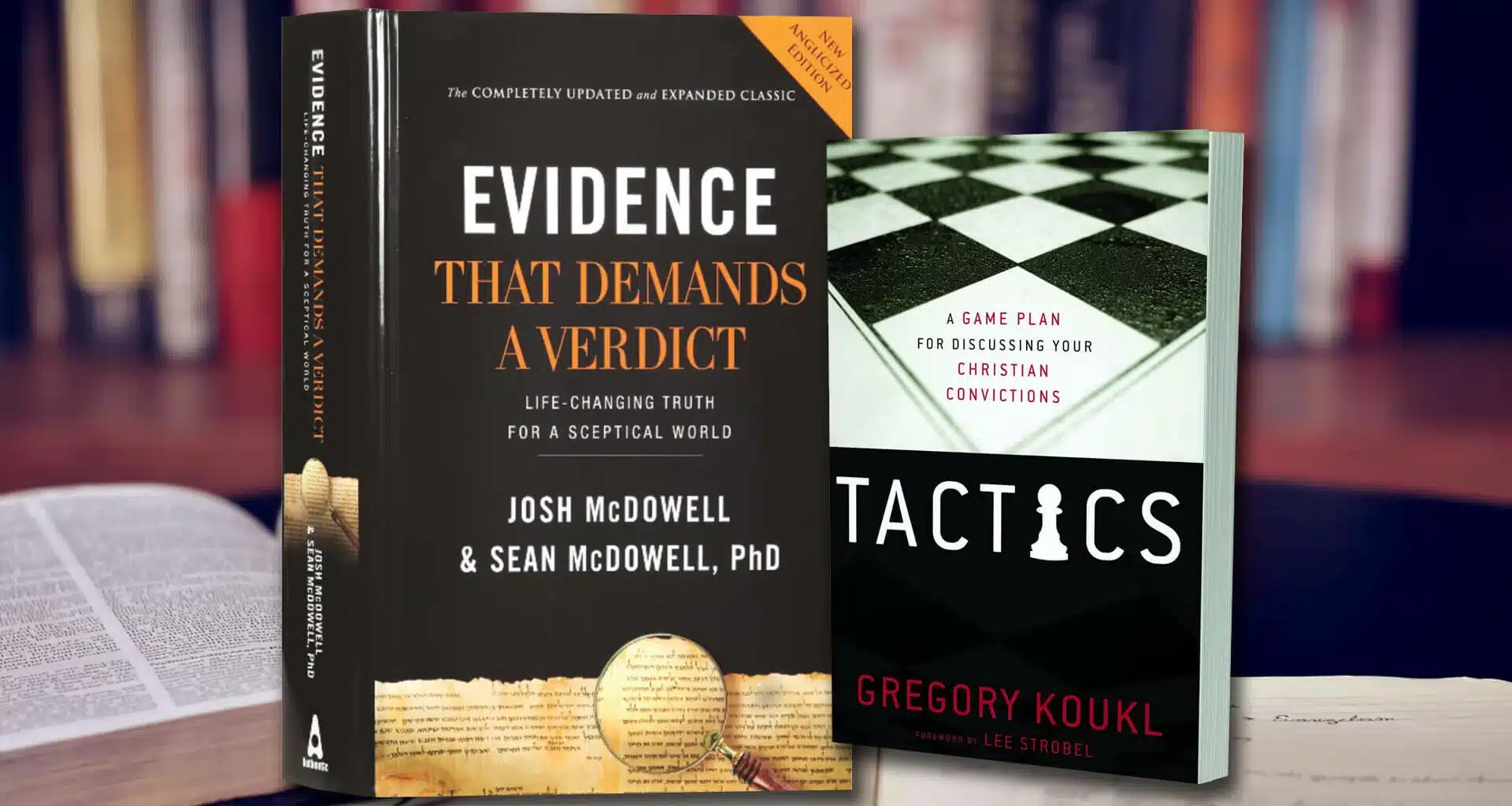Christian apologetics defends and explains the Christian faith. It does so with reasoned arguments and evidence. It seeks to answer tough questions about God, Jesus, morality, and the Bible. Apologetic books are invaluable resources for all. They help believers deepen their faith and seekers explore Christianity. They help skeptics understand it better. This article lists and reviews the best Christian apologetic books. They are vital for understanding and defending the Christian worldview.
Best Christian Apologetic Books
- “Mere Christianity” by C.S. Lewis
- “The Reason for God: Belief in an Age of Skepticism” by Timothy Keller
- “Evidence That Demands a Verdict” by Josh McDowell and Sean McDowell
- “The Case for Christ” by Lee Strobel
- “Tactics: A Game Plan for Discussing Your Christian Convictions” by Gregory Koukl
- “I Don’t Have Enough Faith to Be an Atheist” by Norman Geisler and Frank Turek
- “Cold-Case Christianity” by J. Warner Wallace
- “Reasonable Faith” by William Lane Craig
- “On Guard” by William Lane Craig
- “Why I Believe” by Chip Ingram
“Mere Christianity” by C.S. Lewis
- Overview: This classic by C.S. Lewis is a top apologetic book. It gives a rational explanation of the Christian faith. For those seeking spiritual and intellectual growth, this book is among the best books to increase intelligence, blending logical reasoning with profound insights into Christianity.
- Highlights:
- Explores universal morality as evidence of God’s existence.
- Breaks down complex theological concepts into simple language.
- Why It’s Essential: It appeals to believers and skeptics. It makes a strong case for Christianity’s truth and relevance.
“The Reason for God: Belief in an Age of Skepticism” by Timothy Keller
- Overview: In this book, Timothy Keller addresses skeptics’ doubts and believers’ questions. It is both thoughtful and accessible.
- Highlights:
- Tackles common objections like suffering and exclusivity of faith.
- Balances reason and faith seamlessly.
- Why It’s Essential: Keller’s logical approach and relatable examples make it a must-read for anyone questioning Christianity.
“Evidence That Demands a Verdict” by Josh McDowell and Sean McDowell
- Overview: This comprehensive resource compiles historical evidence supporting Christianity’s claims.
- Highlights:
- Covers the reliability of Scripture and the resurrection of Jesus.
- Updated to address modern challenges to faith.
- Why It’s Essential: It’s a go-to reference for defending the Christian faith with factual evidence.
“The Case for Christ” by Lee Strobel
- Overview: A former atheist journalist investigates the evidence for Jesus in this book. It is both engaging and thorough.
- Highlights:
- Interviews leading experts on historical, scientific, and psychological aspects of Christianity.
- Reads like a detective story, making it accessible and compelling.
- Why It’s Essential: It provides well-researched arguments that appeal to skeptics.
“Tactics: A Game Plan for Discussing Your Christian Convictions” by Gregory Koukl
- Overview: This practical guide teaches readers how to discuss their faith.
- Highlights:
- Offers conversational strategies to address tough questions.
- Encourages calm and thoughtful dialogue rather than heated debates.
- Why It’s Essential: It helps Christians share and defend their faith in daily chats.
“I Don’t Have Enough Faith to Be an Atheist” by Norman Geisler and Frank Turek
- Overview: This book argues that atheism requires more faith than Christianity. It does so by examining logical and scientific evidence.
- Highlights:
- Explores topics like the origins of the universe and morality.
- Combines philosophy, science, and theology effectively.
- Why It’s Essential: It’s an excellent resource for those who want to engage with atheistic arguments.
“Cold-Case Christianity” by J. Warner Wallace
- Overview: A former atheist and cold-case detective wrote this book. It examines the Gospels like a criminal investigation.
- Highlights:
- Applies forensic techniques to analyze biblical claims.
- Offers a unique perspective on evidence for Christianity.
- Why It’s Essential: It’s a fresh approach that makes complex evidence engaging and relatable.
“Reasonable Faith” by William Lane Craig
- Overview: A scholarly yet accessible book that addresses philosophical arguments for Christianity.
- Highlights:
- Discusses the existence of God, the problem of evil, and the resurrection.
- Appeals to intellectually curious readers.
- Why It’s Essential: It builds a strong base to understand and defend Christian beliefs.
“On Guard” by William Lane Craig
- Overview: A simpler version of “Reasonable Faith”, this book is designed for laypeople.
- Highlights:
- Focuses on key apologetic arguments in a concise manner.
- Includes practical tips for engaging with skeptics.
- Why It’s Essential: It’s a perfect starting point for those new to apologetics.
“Why I Believe” by Chip Ingram
- Overview: This book blends personal stories with evidence. It shows why Christianity is credible and life-changing.
- Highlights:
- Addresses questions about Jesus, the Bible, and eternal life.
- Written in a conversational and relatable tone.
- Why It’s Essential: It connects personal faith with intellectual inquiry.
Why Read Christian Apologetic Books?
- Deepen Your Faith: These books will help you understand the Bible better. They teach its lessons and help you grow spiritually.
- Answer Tough Questions: Apologetic books help you tackle tough doubts and challenges, both yours and others’.
- Engage with Skeptics: They offer tools for respectful, informed talks about Christianity.
- Strengthen Evangelism: With a solid foundation, you can share your faith with others.
FAQs About Christian Apologetic Books
What are Christian apologetics?
Christian apologetics defends the faith using reason and evidence. It answers questions and doubts about Christianity.
Which book is best for beginners?
“Mere Christianity” by C.S. Lewis is a great starting point. It clearly and engagingly explains Christianity.
Are these books suitable for skeptics?
Yes, books like “The Case for Christ” by Lee Strobel and “The Reason for God” by Timothy Keller target skeptics. They address common objections to Christianity.
Can I use these books for group studies?
Absolutely. Many of these books, like “Cold-Case Christianity” and “Tactics,” are for study by individuals and groups. They include discussion questions and resources.
Conclusion
Christian apologetic books are vital. They help anyone who wants to understand, defend, or explore the Christian faith. These books, for believers, seekers, and skeptics, argue for Christianity’s truth. They provide strong evidence and reasoning. From classics like “Mere Christianity” to practical guides like “Tactics”, these works offer invaluable insights for engaging with questions about God, Jesus, and the Bible. Begin your journey into Christian apologetics with these tools. They will help you face questions and challenges with confidence.

